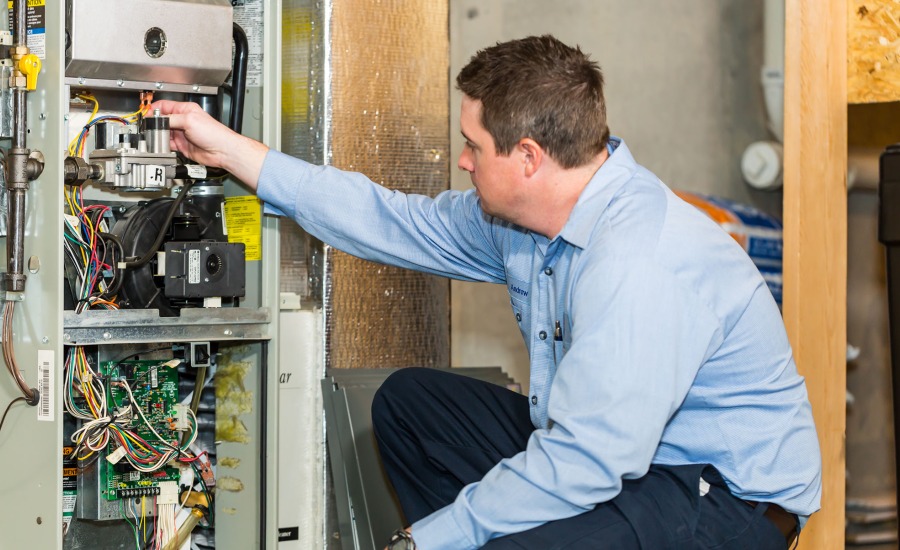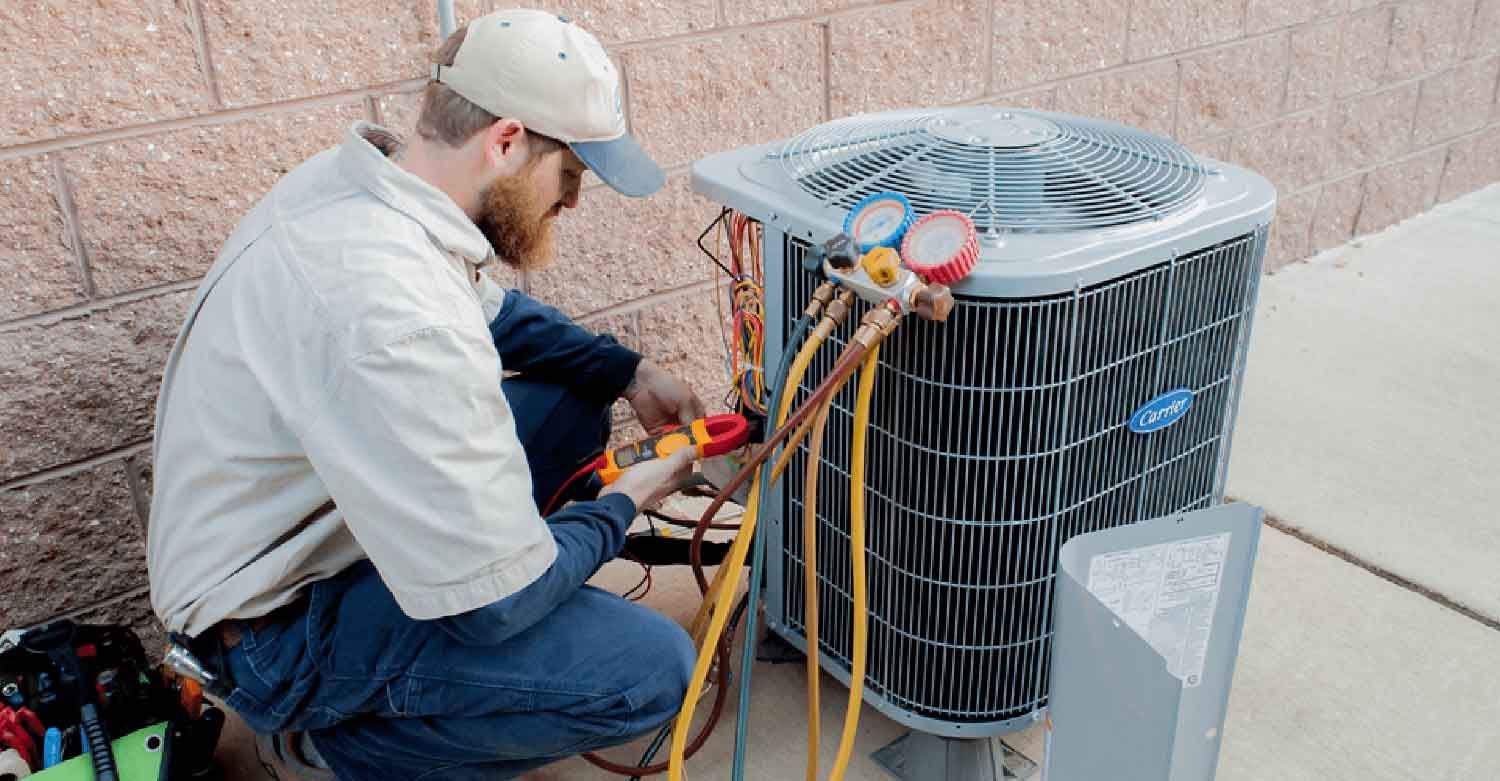Certain limitations do apply, please call for more details.
For Service Now, Call Us Right Now!
- HVAC Contractor
- HVAC Repair
- HVAC Installation
- Furnace Repair
- Furnace Installation
- Heat Pump Repair
- Heat Pump Installation
- Central Heating Repair
- Central Heating Installation
- Heating and Cooling Repair
- Heating and Cooling Installation
- Air Conditioner Repair
- Air Conditioning Installation
- Air Duct Cleaning Services
- Ductless Heating and AC Services
- Install AC
- Install Ducts and Vents
- Install Heating System
- Install Thermostat
- AC Maintenance
- Heating Maintenance
- HVAC Maintenance
- Repair AC
- Repair Ducts and Vents
- Repair Heating System
- Repair HVAC
- Repair Thermostat
- Clean Ducts and Vents
off



Why You Should Hire a Central Heating Repair Specialist
There are many ways to make sure your central heating system is in good condition before hiring a professional to service it. First, check the thermostat. If it's a battery-operated thermostat, it might be dead or have low batteries. If it's on, try turning the heat on to see if the furnace door needs to be opened or closed. If all three are shut, you should contact a professional HVAC repair service.
Having a central heating repair expert inspect your home can help ensure that your central heating system is working properly. This process involves assessing the condition of the system, including its efficiency and energy usage. A faulty central heating system will lead to frequent breakdowns, which can be expensive to fix. An experienced engineer will be able to determine what's wrong and how to get it fixed. They will use a flow chart to guide them throughout the process, from troubleshooting to troubleshooting.
If you aren't a handyman, you might consider hiring a professional to do the work. This will save you a lot of money because a professional will know what to look for and what to avoid. A qualified technician can isolate problems in your central heating system and fix them correctly. Also, he'll have more experience in the area and be able to diagnose the problem. When choosing a central heating repair expert, it's important to know that you can trust their experience.
A central heating repair specialist can solve a variety of problems. Most of them are standard tasks that a homeowner can handle. Other issues are dangerous or require a professional. A professional can handle both types of situations. Whether you decide to hire a professional or do the work yourself, it's important to assess the problem before contacting a specialist. They'll come to your home and provide you with the best advice possible.
A professional central heating repair specialist will be able to troubleshoot the problem and determine what exactly is the cause of the issue. An experienced technician will be able to isolate any problems and fix them properly. It's also important to remember that a central heating system can be extremely expensive to fix. A professional can help you save money by eliminating the need to spend extra money on a costly, unnecessary service. A quality service technician will also make the entire process easier.
If you need to have your central heating system fixed, you can find a professional service. A certified tradesman will be able to service a variety of brands, including Shemtov. They'll also be able to replace the parts of your central heating system. A licensed contractor is a trusted source for any type of repair. They have the necessary tools and have trained staff to make your central heating system work well.
A professional tradesman will inspect your central heating system and determine what repairs are necessary. Some of the more common repairs involve replacing a thermostat or a loose valve. If your system needs replacement parts, a licensed repairman can do it for you. In most cases, a licensed serviceman will charge you a small fee for the labor. A professional is likely to be able to save you money because they have a comprehensive knowledge of the parts and the symptoms of a malfunctioning central heating system.
A central heating system requires periodic visual checks. You should pay particular attention to any leaks, ductwork, or wires. Listen for unusual sounds. If your home isn't comfortable, call a professional right away. If your ductwork isn't up to par, you'll need a professional as well. It's important to hire a heating company who has the necessary training to diagnose the problem properly and can handle it in a timely manner.
Fortunately, a licensed central heating repair service will take care of all major repairs for you. This will ensure your central heating system is running as efficiently as possible while maintaining maximum efficiency. A professional HVAC service technician will check your system and diagnose any problems that need fixing before winter begins. You can also purchase a warranty to protect your investment. Most insurance companies offer flexible plans and will cover the cost of repairing your system for you. The warranty will cover most repairs that your central heating system has to perform.
Key Benefits
Our approach has been simple. Provide a competitive price using qualified HVAC technicians with no hidden fees, backed by a 100% guarantee on workmanship. Our HVAC contractors are available now for any heating and cooling repairs or installation services for your home or business.
Professional Team
Factory Trained Technicians: We only employ factory trained technicians, they’re the best in the industry. Your work will be done right the first time.
Work done on Time
With over 25 years of experience in the industry, we boast all of the knowledge and expertise needed to handle even your most stubborn HVAC issues.
24/7 Emergency Service
We have technicians available for all heating and cooling jobs and we are available 24/7
Award Winning Firm
We are dedicated to the pursuit of excellence and the demonstration of high professional standards.
More Information
Why Central Heating Stays on Even When Switched Off
If your central heating is on but not the radiators, it could be because the thermostat has malfunctioned. Normally, the valves on the hot water cylinder and room radiators open and close as required during the day. If they fail, the hot water will continue to flow to the radiators, even if the central heating has been switched off. This could result in expensive damage to your home. You should contact a local heating company for assistance. Another cause for central heating to stay on when you switch off the boiler is air trapped in the system. It can also be caused by leaky radiators or taps. Using a vacuum cleaner to clean this system can help you avoid costly repairs. It will help you get rid of this problem once and for all. If your radiators are dripping water, they will not get hot enough and may not work as well. In some cases, the heating system may be set to the highest temperature, but this will not stop the system from delivering heat when you're not using it. A simple fix is to set the thermostat to the lowest temperature. If you use a thermostat with HEAT OFF/COOL controls, make sure you select COOL. In this way, your home will be cooler and warmer even when the thermostat is switched off.
What is the Most Economical Temperature For Central Heating?
The most efficient temperature for central heating is the one that provides the best level of comfort and warmth. This is usually about eighteen degrees, which is a comfortable temperature to most people. Even just one degree reduction will save you money. And the more you lower the thermostat, the more you save. In fact, every degree you lower the temperature, the more money you'll save. So, the next time you're deciding on an ideal temperature, try these tips. Experts advise that the perfect temperature for heating is between 18 and 22 degrees. The lower the number, the more expensive it is. That being said, there are exceptions to this rule, but if you're trying to save money on heating, try to set your thermostat to the cheapest possible setting. The ideal temperature for heating is between twenty-one degrees during the day, and fifteen to seventeen degrees at night. If you're living in a very cold climate, the most economical temperature for central heating is eighteen to nineteen degrees. However, if you're living in an off-grid house, you might want to choose an LPG system. Although electricity tariffs can match LPG prices, they can be costly to run. And if you're worried about running out of fuel, the best choice is mains gas fueled.
How Many Watts Does Central Heating Use in Your Home?
How many watts does central heating use in your home? The answer is determined by the type of system you have and the number of rooms in your home. The following information provides an estimate of how much power your system uses. Typical models use approximately 2,000 watts per hour. The power consumed by a space heater depends on the size of the unit. The more energy-efficient your system is, the lower the cost of electricity. The average central heating system consumes approximately 3500 watts per hour when it is in its cooling mode. However, different models will use different amounts of energy. In most cases, you will want to purchase an energy-efficient model. Depending on the size of the system, it will need a different amount of power than one with a lower capacity. A more efficient model should be at least 5 to 10 kW. Generally, central heating pumps use around 60 watts. This amount is less than the energy required to boil a kettle. It is important to note that the size of your central heating system will determine its energy consumption. You should also consider the efficiency of the unit. If the heating system is not performing as efficiently as you expect, you can save even more money by switching to a more energy-efficient system.
How Does a Central Heating Radiator Work?
A central heating radiator gives off heat by passing hot water through internal pipes. This water is then circulated throughout the room through convection and radiation. The water also warms the air in the room around it. The heated air rises and draws cooler air to it, which creates vertical currents. The heat from the radiator is then distributed throughout the entire room. The more hot, dry air is pushed out of the room, the warmer it becomes. Radiators heat the air through convection and radiation. The former is similar to the heat emitted from an open fire or stove. The latter contributes to the heat contribution of a radiator. The heated air rises and pulls cooler air in, creating a spiraling movement. The movement of the air forms vertical currents that carry the heated and cooled air. The water is circulated through the house, warming the air in the room. Radiators are made of copper pipe. To keep the water hot, turn the valve all the way down. To turn the radiator on, open the valve and let the water flow faster. To turn the radiator off, turn the valve all the way. When the water is cold, the valve will shut off. When the room is hot, turn the valve to the left and the water will run out of the top pipe.
Where are your service locations?
Award winning work
Expert, guaranteed workmanship. Warranty on Parts & Labor
We are accountable to each other and the community we have sworn to serve. We are dedicated to the pursuit of excellence and the demonstration of high professional standards.


